Effective Communication: Concepts & Future
VerifiedAdded on 2023/04/24
|9
|2586
|318
AI Summary
This essay discusses the ten significant concepts of effective communication, literature review on non-verbal communication and listening, and application of ethical and organizational communication in future career aspirations.
Contribute Materials
Your contribution can guide someone’s learning journey. Share your
documents today.
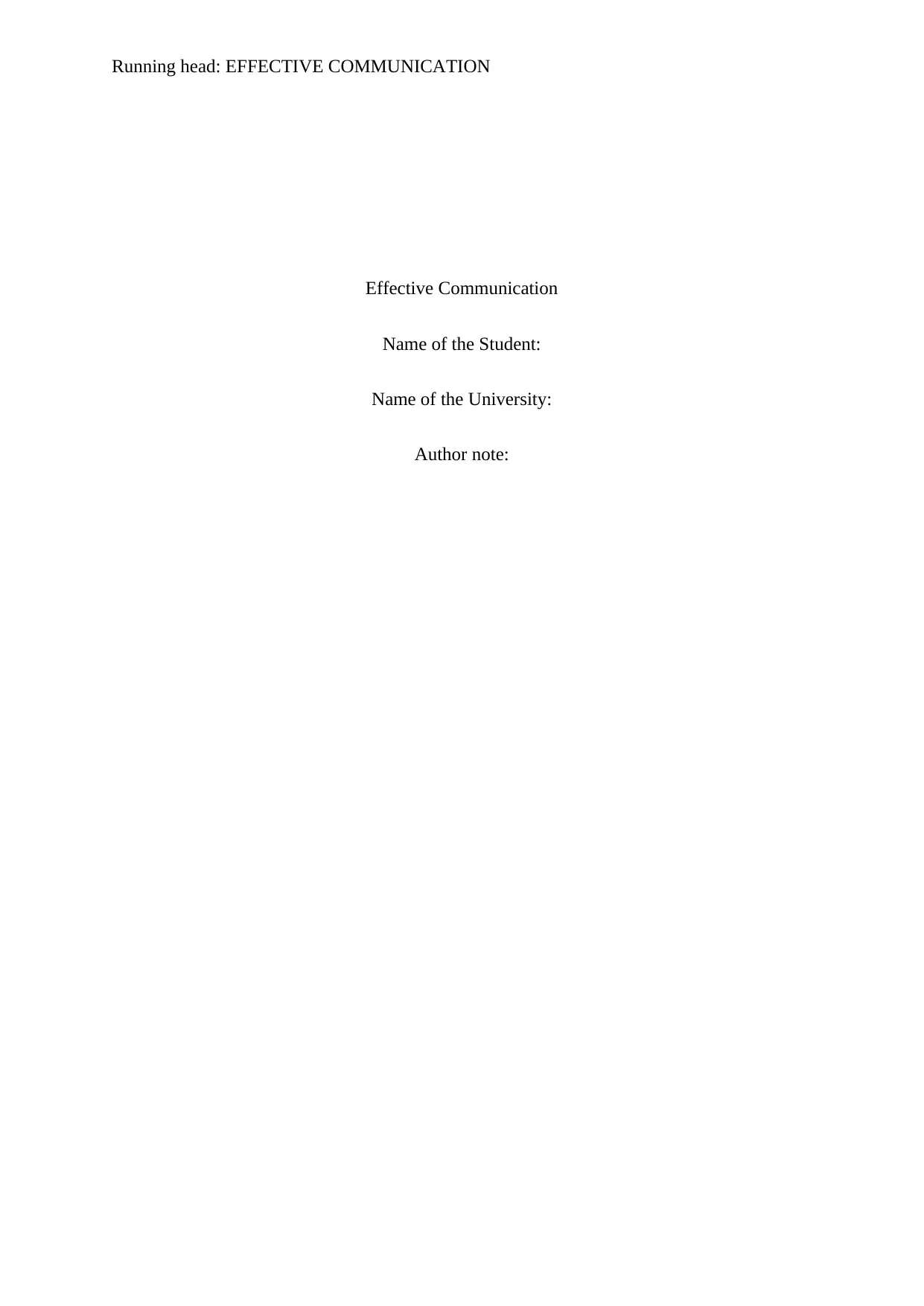
Running head: EFFECTIVE COMMUNICATION
Effective Communication
Name of the Student:
Name of the University:
Author note:
Effective Communication
Name of the Student:
Name of the University:
Author note:
Secure Best Marks with AI Grader
Need help grading? Try our AI Grader for instant feedback on your assignments.
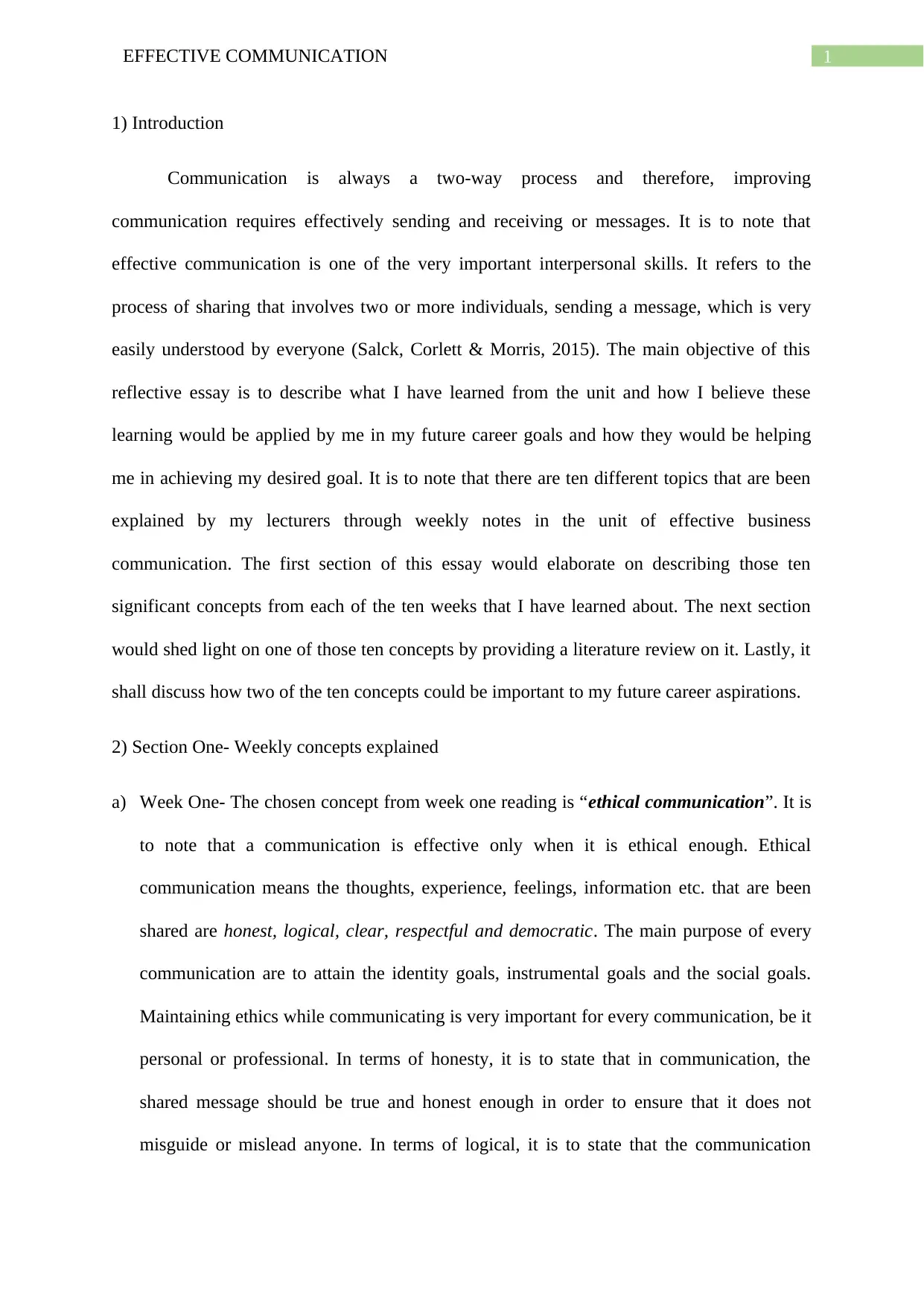
1EFFECTIVE COMMUNICATION
1) Introduction
Communication is always a two-way process and therefore, improving
communication requires effectively sending and receiving or messages. It is to note that
effective communication is one of the very important interpersonal skills. It refers to the
process of sharing that involves two or more individuals, sending a message, which is very
easily understood by everyone (Salck, Corlett & Morris, 2015). The main objective of this
reflective essay is to describe what I have learned from the unit and how I believe these
learning would be applied by me in my future career goals and how they would be helping
me in achieving my desired goal. It is to note that there are ten different topics that are been
explained by my lecturers through weekly notes in the unit of effective business
communication. The first section of this essay would elaborate on describing those ten
significant concepts from each of the ten weeks that I have learned about. The next section
would shed light on one of those ten concepts by providing a literature review on it. Lastly, it
shall discuss how two of the ten concepts could be important to my future career aspirations.
2) Section One- Weekly concepts explained
a) Week One- The chosen concept from week one reading is “ethical communication”. It is
to note that a communication is effective only when it is ethical enough. Ethical
communication means the thoughts, experience, feelings, information etc. that are been
shared are honest, logical, clear, respectful and democratic. The main purpose of every
communication are to attain the identity goals, instrumental goals and the social goals.
Maintaining ethics while communicating is very important for every communication, be it
personal or professional. In terms of honesty, it is to state that in communication, the
shared message should be true and honest enough in order to ensure that it does not
misguide or mislead anyone. In terms of logical, it is to state that the communication
1) Introduction
Communication is always a two-way process and therefore, improving
communication requires effectively sending and receiving or messages. It is to note that
effective communication is one of the very important interpersonal skills. It refers to the
process of sharing that involves two or more individuals, sending a message, which is very
easily understood by everyone (Salck, Corlett & Morris, 2015). The main objective of this
reflective essay is to describe what I have learned from the unit and how I believe these
learning would be applied by me in my future career goals and how they would be helping
me in achieving my desired goal. It is to note that there are ten different topics that are been
explained by my lecturers through weekly notes in the unit of effective business
communication. The first section of this essay would elaborate on describing those ten
significant concepts from each of the ten weeks that I have learned about. The next section
would shed light on one of those ten concepts by providing a literature review on it. Lastly, it
shall discuss how two of the ten concepts could be important to my future career aspirations.
2) Section One- Weekly concepts explained
a) Week One- The chosen concept from week one reading is “ethical communication”. It is
to note that a communication is effective only when it is ethical enough. Ethical
communication means the thoughts, experience, feelings, information etc. that are been
shared are honest, logical, clear, respectful and democratic. The main purpose of every
communication are to attain the identity goals, instrumental goals and the social goals.
Maintaining ethics while communicating is very important for every communication, be it
personal or professional. In terms of honesty, it is to state that in communication, the
shared message should be true and honest enough in order to ensure that it does not
misguide or mislead anyone. In terms of logical, it is to state that the communication
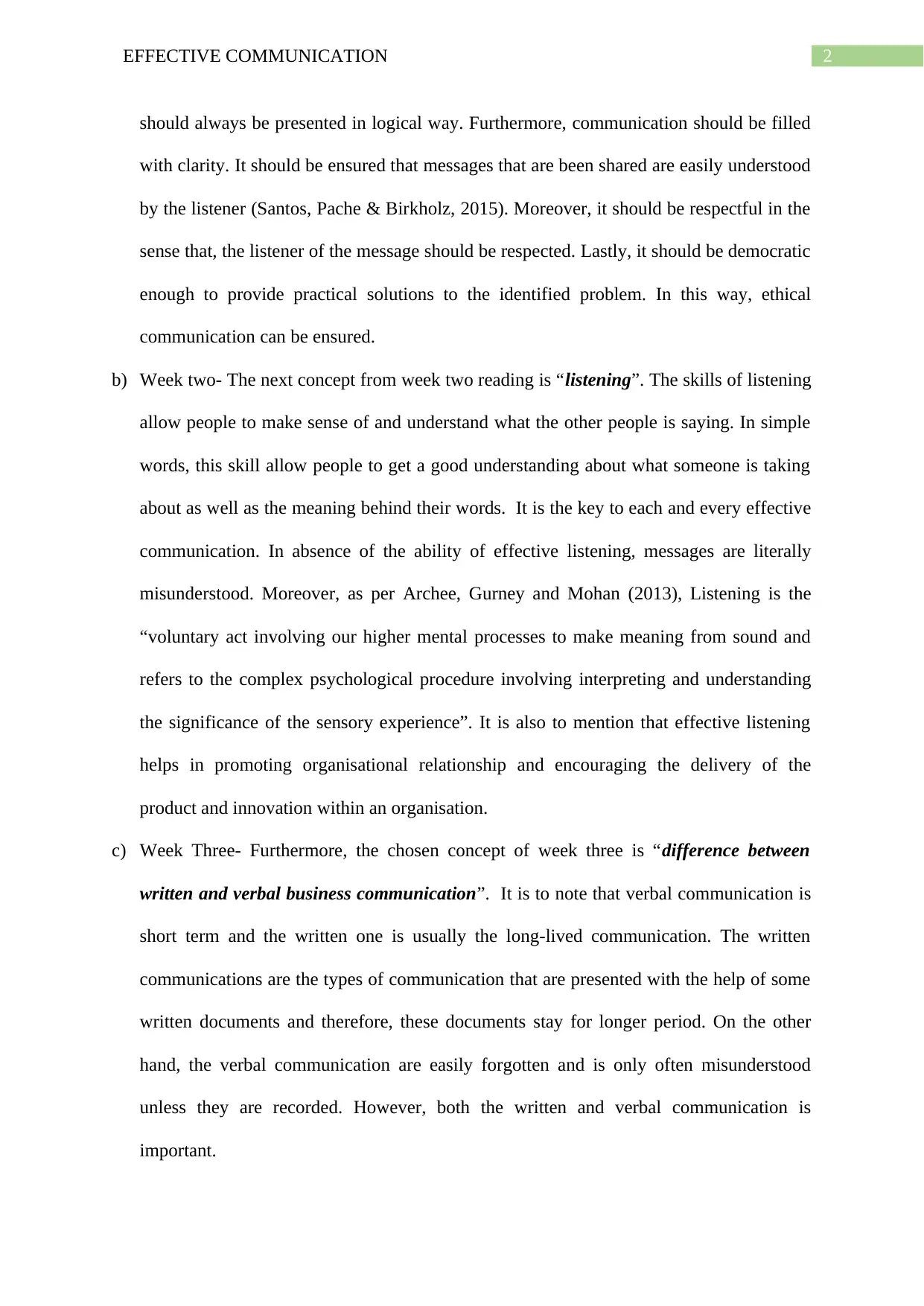
2EFFECTIVE COMMUNICATION
should always be presented in logical way. Furthermore, communication should be filled
with clarity. It should be ensured that messages that are been shared are easily understood
by the listener (Santos, Pache & Birkholz, 2015). Moreover, it should be respectful in the
sense that, the listener of the message should be respected. Lastly, it should be democratic
enough to provide practical solutions to the identified problem. In this way, ethical
communication can be ensured.
b) Week two- The next concept from week two reading is “listening”. The skills of listening
allow people to make sense of and understand what the other people is saying. In simple
words, this skill allow people to get a good understanding about what someone is taking
about as well as the meaning behind their words. It is the key to each and every effective
communication. In absence of the ability of effective listening, messages are literally
misunderstood. Moreover, as per Archee, Gurney and Mohan (2013), Listening is the
“voluntary act involving our higher mental processes to make meaning from sound and
refers to the complex psychological procedure involving interpreting and understanding
the significance of the sensory experience”. It is also to mention that effective listening
helps in promoting organisational relationship and encouraging the delivery of the
product and innovation within an organisation.
c) Week Three- Furthermore, the chosen concept of week three is “difference between
written and verbal business communication”. It is to note that verbal communication is
short term and the written one is usually the long-lived communication. The written
communications are the types of communication that are presented with the help of some
written documents and therefore, these documents stay for longer period. On the other
hand, the verbal communication are easily forgotten and is only often misunderstood
unless they are recorded. However, both the written and verbal communication is
important.
should always be presented in logical way. Furthermore, communication should be filled
with clarity. It should be ensured that messages that are been shared are easily understood
by the listener (Santos, Pache & Birkholz, 2015). Moreover, it should be respectful in the
sense that, the listener of the message should be respected. Lastly, it should be democratic
enough to provide practical solutions to the identified problem. In this way, ethical
communication can be ensured.
b) Week two- The next concept from week two reading is “listening”. The skills of listening
allow people to make sense of and understand what the other people is saying. In simple
words, this skill allow people to get a good understanding about what someone is taking
about as well as the meaning behind their words. It is the key to each and every effective
communication. In absence of the ability of effective listening, messages are literally
misunderstood. Moreover, as per Archee, Gurney and Mohan (2013), Listening is the
“voluntary act involving our higher mental processes to make meaning from sound and
refers to the complex psychological procedure involving interpreting and understanding
the significance of the sensory experience”. It is also to mention that effective listening
helps in promoting organisational relationship and encouraging the delivery of the
product and innovation within an organisation.
c) Week Three- Furthermore, the chosen concept of week three is “difference between
written and verbal business communication”. It is to note that verbal communication is
short term and the written one is usually the long-lived communication. The written
communications are the types of communication that are presented with the help of some
written documents and therefore, these documents stay for longer period. On the other
hand, the verbal communication are easily forgotten and is only often misunderstood
unless they are recorded. However, both the written and verbal communication is
important.
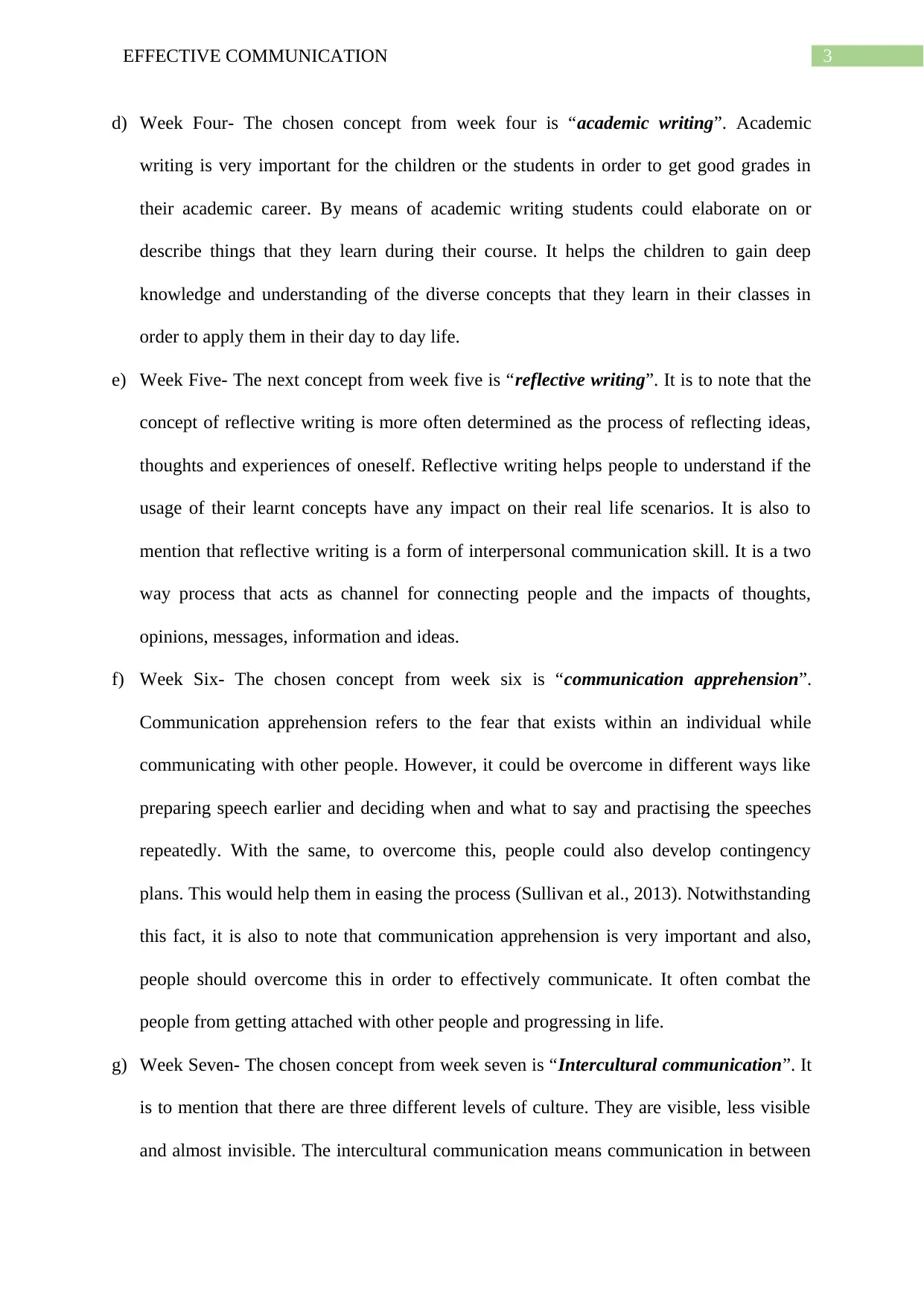
3EFFECTIVE COMMUNICATION
d) Week Four- The chosen concept from week four is “academic writing”. Academic
writing is very important for the children or the students in order to get good grades in
their academic career. By means of academic writing students could elaborate on or
describe things that they learn during their course. It helps the children to gain deep
knowledge and understanding of the diverse concepts that they learn in their classes in
order to apply them in their day to day life.
e) Week Five- The next concept from week five is “reflective writing”. It is to note that the
concept of reflective writing is more often determined as the process of reflecting ideas,
thoughts and experiences of oneself. Reflective writing helps people to understand if the
usage of their learnt concepts have any impact on their real life scenarios. It is also to
mention that reflective writing is a form of interpersonal communication skill. It is a two
way process that acts as channel for connecting people and the impacts of thoughts,
opinions, messages, information and ideas.
f) Week Six- The chosen concept from week six is “communication apprehension”.
Communication apprehension refers to the fear that exists within an individual while
communicating with other people. However, it could be overcome in different ways like
preparing speech earlier and deciding when and what to say and practising the speeches
repeatedly. With the same, to overcome this, people could also develop contingency
plans. This would help them in easing the process (Sullivan et al., 2013). Notwithstanding
this fact, it is also to note that communication apprehension is very important and also,
people should overcome this in order to effectively communicate. It often combat the
people from getting attached with other people and progressing in life.
g) Week Seven- The chosen concept from week seven is “Intercultural communication”. It
is to mention that there are three different levels of culture. They are visible, less visible
and almost invisible. The intercultural communication means communication in between
d) Week Four- The chosen concept from week four is “academic writing”. Academic
writing is very important for the children or the students in order to get good grades in
their academic career. By means of academic writing students could elaborate on or
describe things that they learn during their course. It helps the children to gain deep
knowledge and understanding of the diverse concepts that they learn in their classes in
order to apply them in their day to day life.
e) Week Five- The next concept from week five is “reflective writing”. It is to note that the
concept of reflective writing is more often determined as the process of reflecting ideas,
thoughts and experiences of oneself. Reflective writing helps people to understand if the
usage of their learnt concepts have any impact on their real life scenarios. It is also to
mention that reflective writing is a form of interpersonal communication skill. It is a two
way process that acts as channel for connecting people and the impacts of thoughts,
opinions, messages, information and ideas.
f) Week Six- The chosen concept from week six is “communication apprehension”.
Communication apprehension refers to the fear that exists within an individual while
communicating with other people. However, it could be overcome in different ways like
preparing speech earlier and deciding when and what to say and practising the speeches
repeatedly. With the same, to overcome this, people could also develop contingency
plans. This would help them in easing the process (Sullivan et al., 2013). Notwithstanding
this fact, it is also to note that communication apprehension is very important and also,
people should overcome this in order to effectively communicate. It often combat the
people from getting attached with other people and progressing in life.
g) Week Seven- The chosen concept from week seven is “Intercultural communication”. It
is to mention that there are three different levels of culture. They are visible, less visible
and almost invisible. The intercultural communication means communication in between
Secure Best Marks with AI Grader
Need help grading? Try our AI Grader for instant feedback on your assignments.
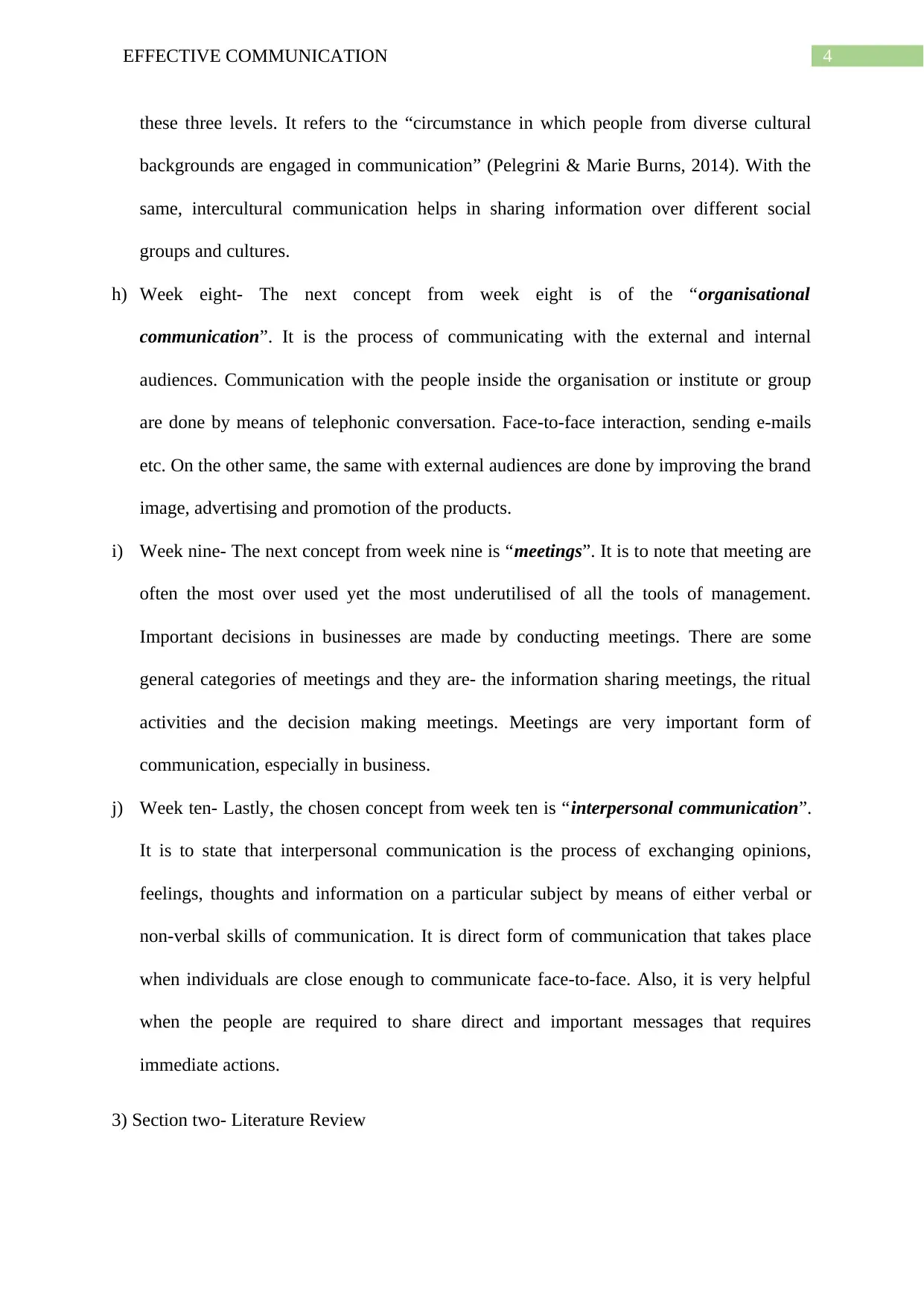
4EFFECTIVE COMMUNICATION
these three levels. It refers to the “circumstance in which people from diverse cultural
backgrounds are engaged in communication” (Pelegrini & Marie Burns, 2014). With the
same, intercultural communication helps in sharing information over different social
groups and cultures.
h) Week eight- The next concept from week eight is of the “organisational
communication”. It is the process of communicating with the external and internal
audiences. Communication with the people inside the organisation or institute or group
are done by means of telephonic conversation. Face-to-face interaction, sending e-mails
etc. On the other same, the same with external audiences are done by improving the brand
image, advertising and promotion of the products.
i) Week nine- The next concept from week nine is “meetings”. It is to note that meeting are
often the most over used yet the most underutilised of all the tools of management.
Important decisions in businesses are made by conducting meetings. There are some
general categories of meetings and they are- the information sharing meetings, the ritual
activities and the decision making meetings. Meetings are very important form of
communication, especially in business.
j) Week ten- Lastly, the chosen concept from week ten is “interpersonal communication”.
It is to state that interpersonal communication is the process of exchanging opinions,
feelings, thoughts and information on a particular subject by means of either verbal or
non-verbal skills of communication. It is direct form of communication that takes place
when individuals are close enough to communicate face-to-face. Also, it is very helpful
when the people are required to share direct and important messages that requires
immediate actions.
3) Section two- Literature Review
these three levels. It refers to the “circumstance in which people from diverse cultural
backgrounds are engaged in communication” (Pelegrini & Marie Burns, 2014). With the
same, intercultural communication helps in sharing information over different social
groups and cultures.
h) Week eight- The next concept from week eight is of the “organisational
communication”. It is the process of communicating with the external and internal
audiences. Communication with the people inside the organisation or institute or group
are done by means of telephonic conversation. Face-to-face interaction, sending e-mails
etc. On the other same, the same with external audiences are done by improving the brand
image, advertising and promotion of the products.
i) Week nine- The next concept from week nine is “meetings”. It is to note that meeting are
often the most over used yet the most underutilised of all the tools of management.
Important decisions in businesses are made by conducting meetings. There are some
general categories of meetings and they are- the information sharing meetings, the ritual
activities and the decision making meetings. Meetings are very important form of
communication, especially in business.
j) Week ten- Lastly, the chosen concept from week ten is “interpersonal communication”.
It is to state that interpersonal communication is the process of exchanging opinions,
feelings, thoughts and information on a particular subject by means of either verbal or
non-verbal skills of communication. It is direct form of communication that takes place
when individuals are close enough to communicate face-to-face. Also, it is very helpful
when the people are required to share direct and important messages that requires
immediate actions.
3) Section two- Literature Review
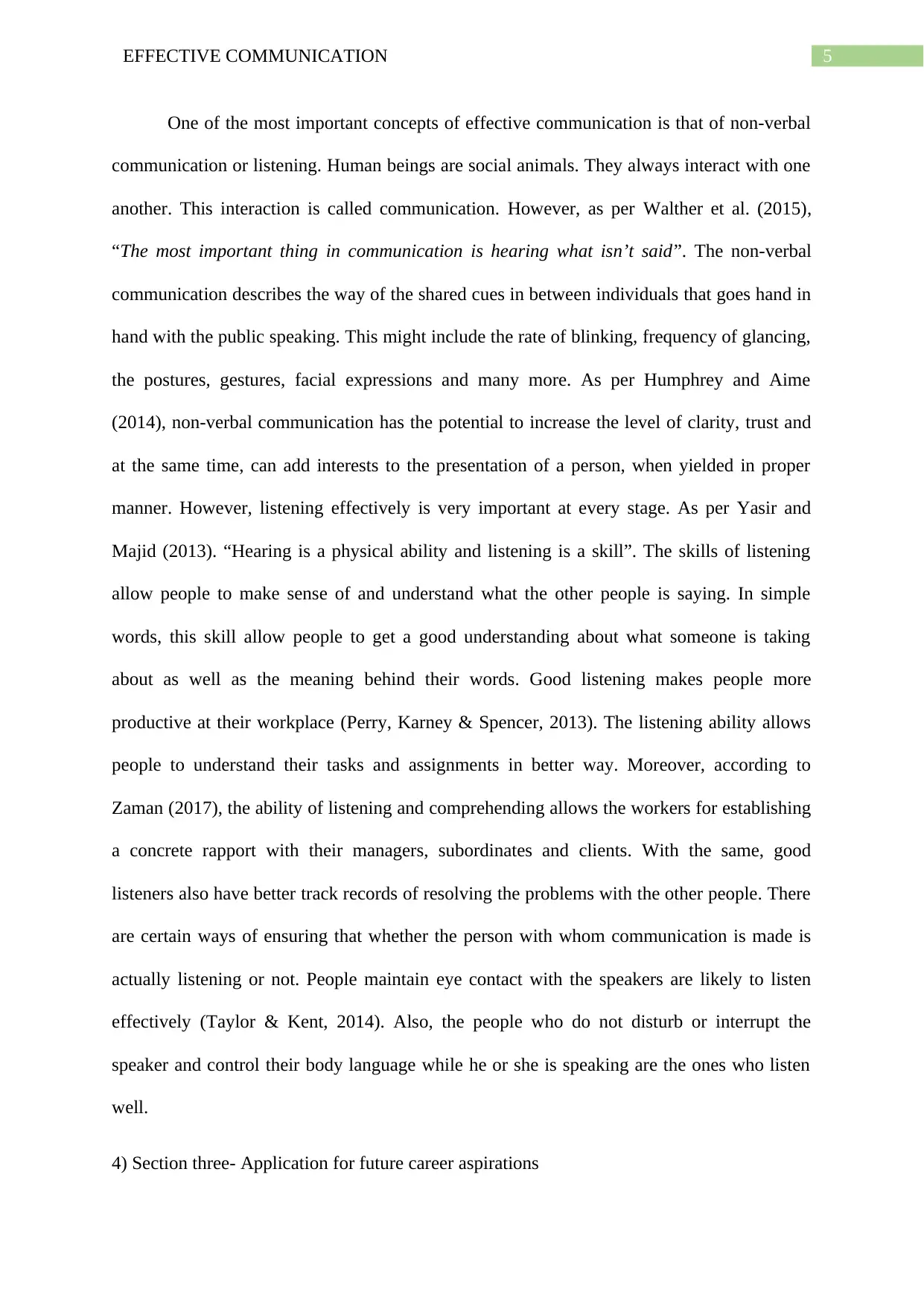
5EFFECTIVE COMMUNICATION
One of the most important concepts of effective communication is that of non-verbal
communication or listening. Human beings are social animals. They always interact with one
another. This interaction is called communication. However, as per Walther et al. (2015),
“The most important thing in communication is hearing what isn’t said”. The non-verbal
communication describes the way of the shared cues in between individuals that goes hand in
hand with the public speaking. This might include the rate of blinking, frequency of glancing,
the postures, gestures, facial expressions and many more. As per Humphrey and Aime
(2014), non-verbal communication has the potential to increase the level of clarity, trust and
at the same time, can add interests to the presentation of a person, when yielded in proper
manner. However, listening effectively is very important at every stage. As per Yasir and
Majid (2013). “Hearing is a physical ability and listening is a skill”. The skills of listening
allow people to make sense of and understand what the other people is saying. In simple
words, this skill allow people to get a good understanding about what someone is taking
about as well as the meaning behind their words. Good listening makes people more
productive at their workplace (Perry, Karney & Spencer, 2013). The listening ability allows
people to understand their tasks and assignments in better way. Moreover, according to
Zaman (2017), the ability of listening and comprehending allows the workers for establishing
a concrete rapport with their managers, subordinates and clients. With the same, good
listeners also have better track records of resolving the problems with the other people. There
are certain ways of ensuring that whether the person with whom communication is made is
actually listening or not. People maintain eye contact with the speakers are likely to listen
effectively (Taylor & Kent, 2014). Also, the people who do not disturb or interrupt the
speaker and control their body language while he or she is speaking are the ones who listen
well.
4) Section three- Application for future career aspirations
One of the most important concepts of effective communication is that of non-verbal
communication or listening. Human beings are social animals. They always interact with one
another. This interaction is called communication. However, as per Walther et al. (2015),
“The most important thing in communication is hearing what isn’t said”. The non-verbal
communication describes the way of the shared cues in between individuals that goes hand in
hand with the public speaking. This might include the rate of blinking, frequency of glancing,
the postures, gestures, facial expressions and many more. As per Humphrey and Aime
(2014), non-verbal communication has the potential to increase the level of clarity, trust and
at the same time, can add interests to the presentation of a person, when yielded in proper
manner. However, listening effectively is very important at every stage. As per Yasir and
Majid (2013). “Hearing is a physical ability and listening is a skill”. The skills of listening
allow people to make sense of and understand what the other people is saying. In simple
words, this skill allow people to get a good understanding about what someone is taking
about as well as the meaning behind their words. Good listening makes people more
productive at their workplace (Perry, Karney & Spencer, 2013). The listening ability allows
people to understand their tasks and assignments in better way. Moreover, according to
Zaman (2017), the ability of listening and comprehending allows the workers for establishing
a concrete rapport with their managers, subordinates and clients. With the same, good
listeners also have better track records of resolving the problems with the other people. There
are certain ways of ensuring that whether the person with whom communication is made is
actually listening or not. People maintain eye contact with the speakers are likely to listen
effectively (Taylor & Kent, 2014). Also, the people who do not disturb or interrupt the
speaker and control their body language while he or she is speaking are the ones who listen
well.
4) Section three- Application for future career aspirations
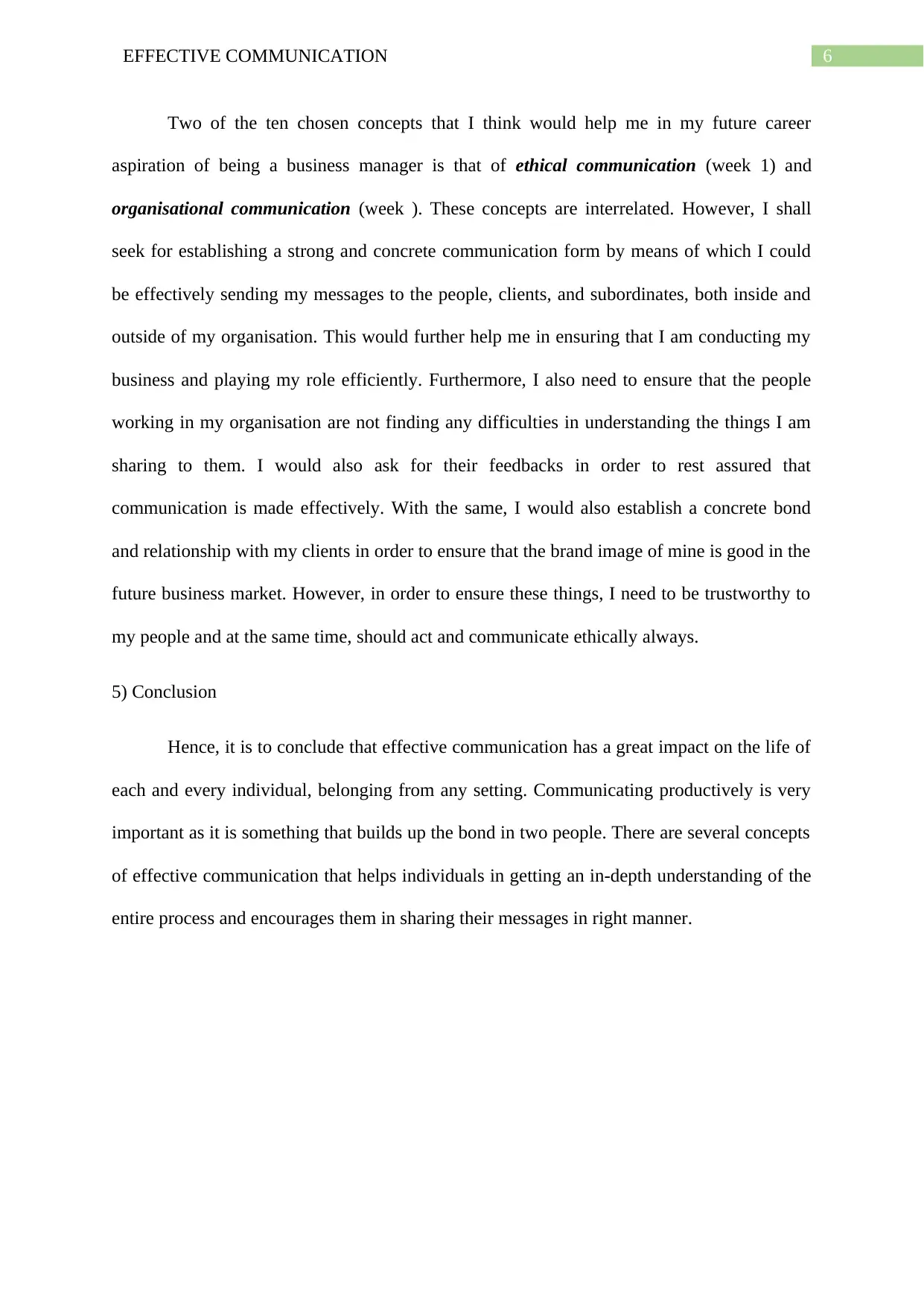
6EFFECTIVE COMMUNICATION
Two of the ten chosen concepts that I think would help me in my future career
aspiration of being a business manager is that of ethical communication (week 1) and
organisational communication (week ). These concepts are interrelated. However, I shall
seek for establishing a strong and concrete communication form by means of which I could
be effectively sending my messages to the people, clients, and subordinates, both inside and
outside of my organisation. This would further help me in ensuring that I am conducting my
business and playing my role efficiently. Furthermore, I also need to ensure that the people
working in my organisation are not finding any difficulties in understanding the things I am
sharing to them. I would also ask for their feedbacks in order to rest assured that
communication is made effectively. With the same, I would also establish a concrete bond
and relationship with my clients in order to ensure that the brand image of mine is good in the
future business market. However, in order to ensure these things, I need to be trustworthy to
my people and at the same time, should act and communicate ethically always.
5) Conclusion
Hence, it is to conclude that effective communication has a great impact on the life of
each and every individual, belonging from any setting. Communicating productively is very
important as it is something that builds up the bond in two people. There are several concepts
of effective communication that helps individuals in getting an in-depth understanding of the
entire process and encourages them in sharing their messages in right manner.
Two of the ten chosen concepts that I think would help me in my future career
aspiration of being a business manager is that of ethical communication (week 1) and
organisational communication (week ). These concepts are interrelated. However, I shall
seek for establishing a strong and concrete communication form by means of which I could
be effectively sending my messages to the people, clients, and subordinates, both inside and
outside of my organisation. This would further help me in ensuring that I am conducting my
business and playing my role efficiently. Furthermore, I also need to ensure that the people
working in my organisation are not finding any difficulties in understanding the things I am
sharing to them. I would also ask for their feedbacks in order to rest assured that
communication is made effectively. With the same, I would also establish a concrete bond
and relationship with my clients in order to ensure that the brand image of mine is good in the
future business market. However, in order to ensure these things, I need to be trustworthy to
my people and at the same time, should act and communicate ethically always.
5) Conclusion
Hence, it is to conclude that effective communication has a great impact on the life of
each and every individual, belonging from any setting. Communicating productively is very
important as it is something that builds up the bond in two people. There are several concepts
of effective communication that helps individuals in getting an in-depth understanding of the
entire process and encourages them in sharing their messages in right manner.
Paraphrase This Document
Need a fresh take? Get an instant paraphrase of this document with our AI Paraphraser
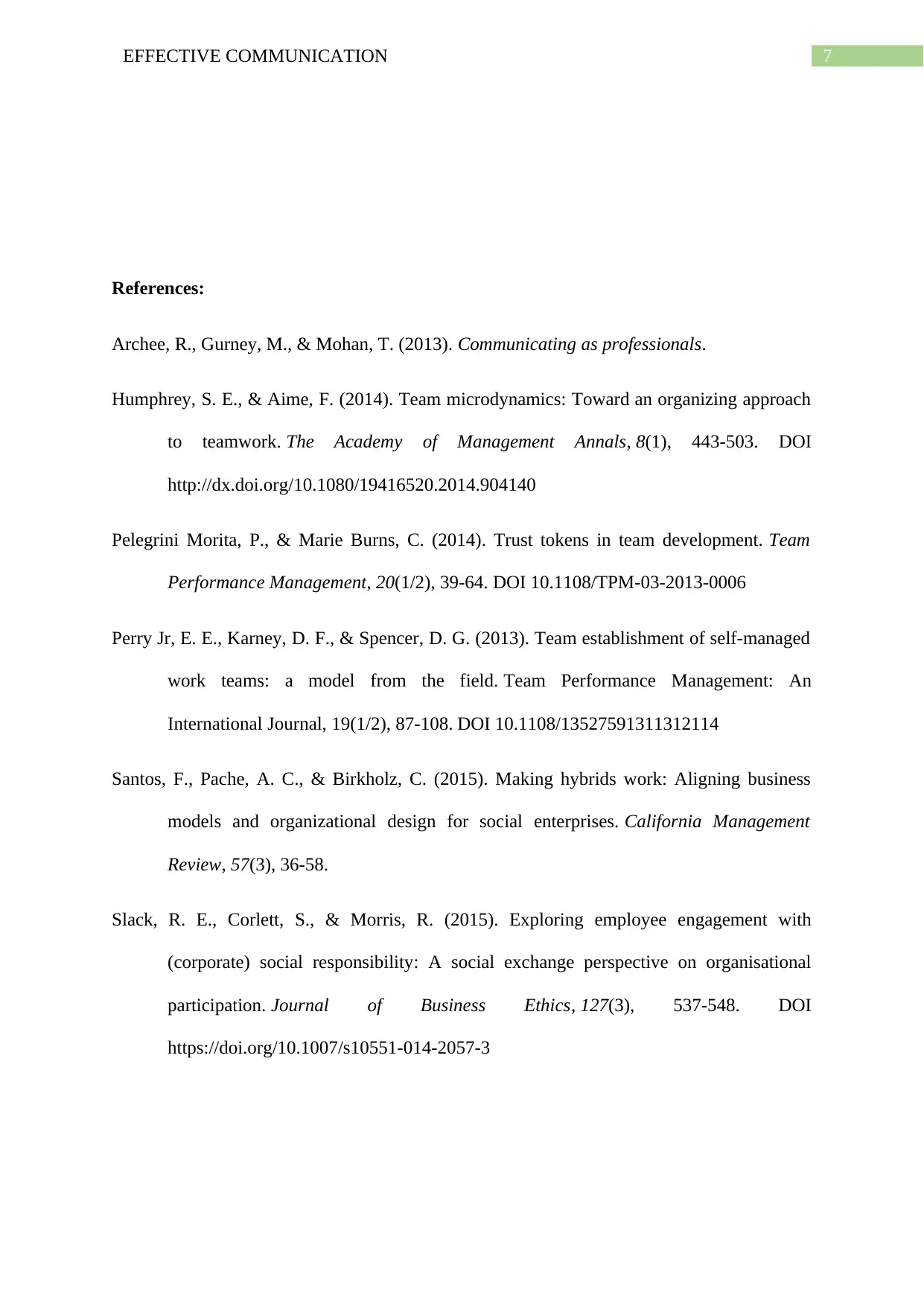
7EFFECTIVE COMMUNICATION
References:
Archee, R., Gurney, M., & Mohan, T. (2013). Communicating as professionals.
Humphrey, S. E., & Aime, F. (2014). Team microdynamics: Toward an organizing approach
to teamwork. The Academy of Management Annals, 8(1), 443-503. DOI
http://dx.doi.org/10.1080/19416520.2014.904140
Pelegrini Morita, P., & Marie Burns, C. (2014). Trust tokens in team development. Team
Performance Management, 20(1/2), 39-64. DOI 10.1108/TPM-03-2013-0006
Perry Jr, E. E., Karney, D. F., & Spencer, D. G. (2013). Team establishment of self-managed
work teams: a model from the field. Team Performance Management: An
International Journal, 19(1/2), 87-108. DOI 10.1108/13527591311312114
Santos, F., Pache, A. C., & Birkholz, C. (2015). Making hybrids work: Aligning business
models and organizational design for social enterprises. California Management
Review, 57(3), 36-58.
Slack, R. E., Corlett, S., & Morris, R. (2015). Exploring employee engagement with
(corporate) social responsibility: A social exchange perspective on organisational
participation. Journal of Business Ethics, 127(3), 537-548. DOI
https://doi.org/10.1007/s10551-014-2057-3
References:
Archee, R., Gurney, M., & Mohan, T. (2013). Communicating as professionals.
Humphrey, S. E., & Aime, F. (2014). Team microdynamics: Toward an organizing approach
to teamwork. The Academy of Management Annals, 8(1), 443-503. DOI
http://dx.doi.org/10.1080/19416520.2014.904140
Pelegrini Morita, P., & Marie Burns, C. (2014). Trust tokens in team development. Team
Performance Management, 20(1/2), 39-64. DOI 10.1108/TPM-03-2013-0006
Perry Jr, E. E., Karney, D. F., & Spencer, D. G. (2013). Team establishment of self-managed
work teams: a model from the field. Team Performance Management: An
International Journal, 19(1/2), 87-108. DOI 10.1108/13527591311312114
Santos, F., Pache, A. C., & Birkholz, C. (2015). Making hybrids work: Aligning business
models and organizational design for social enterprises. California Management
Review, 57(3), 36-58.
Slack, R. E., Corlett, S., & Morris, R. (2015). Exploring employee engagement with
(corporate) social responsibility: A social exchange perspective on organisational
participation. Journal of Business Ethics, 127(3), 537-548. DOI
https://doi.org/10.1007/s10551-014-2057-3
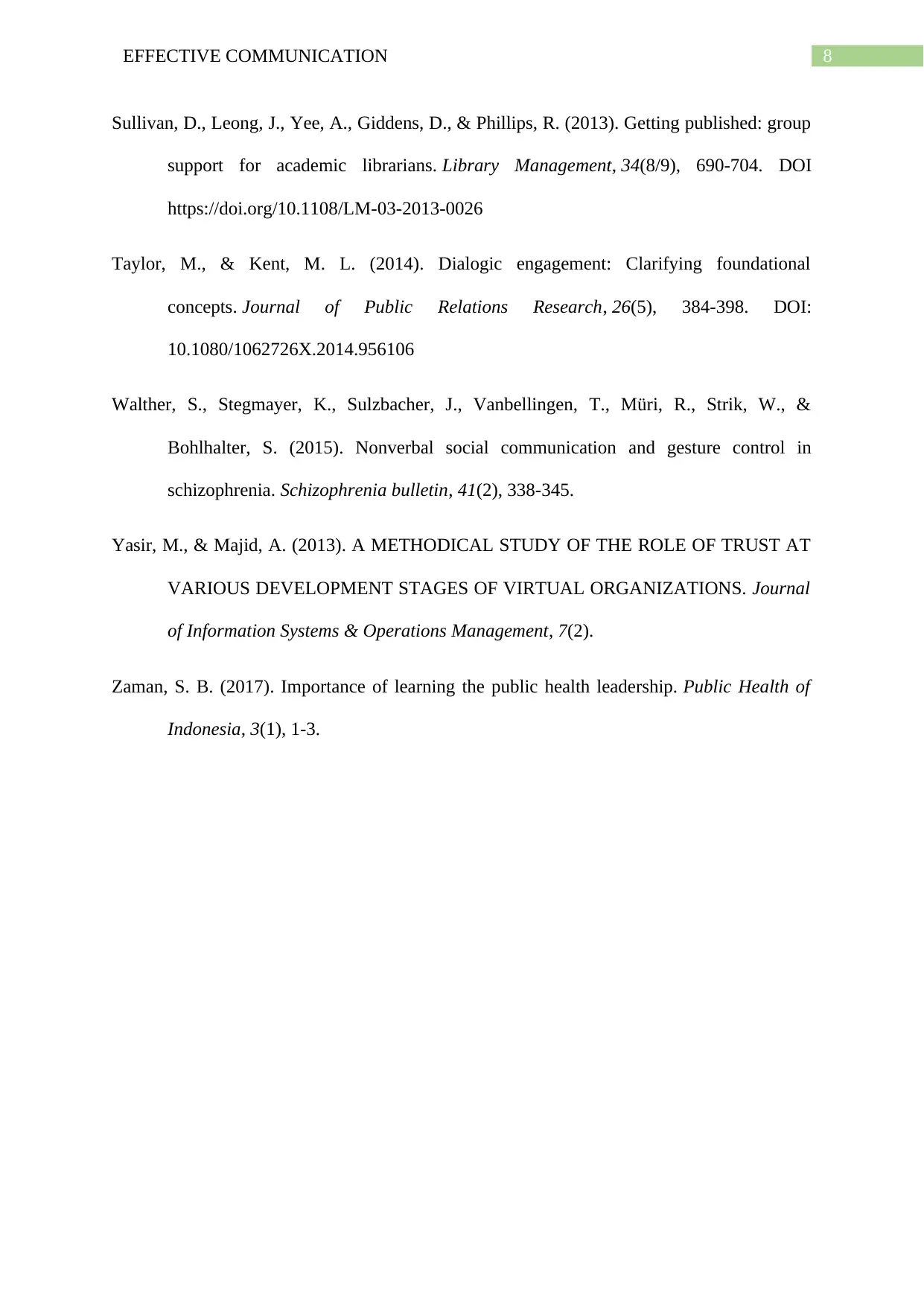
8EFFECTIVE COMMUNICATION
Sullivan, D., Leong, J., Yee, A., Giddens, D., & Phillips, R. (2013). Getting published: group
support for academic librarians. Library Management, 34(8/9), 690-704. DOI
https://doi.org/10.1108/LM-03-2013-0026
Taylor, M., & Kent, M. L. (2014). Dialogic engagement: Clarifying foundational
concepts. Journal of Public Relations Research, 26(5), 384-398. DOI:
10.1080/1062726X.2014.956106
Walther, S., Stegmayer, K., Sulzbacher, J., Vanbellingen, T., Müri, R., Strik, W., &
Bohlhalter, S. (2015). Nonverbal social communication and gesture control in
schizophrenia. Schizophrenia bulletin, 41(2), 338-345.
Yasir, M., & Majid, A. (2013). A METHODICAL STUDY OF THE ROLE OF TRUST AT
VARIOUS DEVELOPMENT STAGES OF VIRTUAL ORGANIZATIONS. Journal
of Information Systems & Operations Management, 7(2).
Zaman, S. B. (2017). Importance of learning the public health leadership. Public Health of
Indonesia, 3(1), 1-3.
Sullivan, D., Leong, J., Yee, A., Giddens, D., & Phillips, R. (2013). Getting published: group
support for academic librarians. Library Management, 34(8/9), 690-704. DOI
https://doi.org/10.1108/LM-03-2013-0026
Taylor, M., & Kent, M. L. (2014). Dialogic engagement: Clarifying foundational
concepts. Journal of Public Relations Research, 26(5), 384-398. DOI:
10.1080/1062726X.2014.956106
Walther, S., Stegmayer, K., Sulzbacher, J., Vanbellingen, T., Müri, R., Strik, W., &
Bohlhalter, S. (2015). Nonverbal social communication and gesture control in
schizophrenia. Schizophrenia bulletin, 41(2), 338-345.
Yasir, M., & Majid, A. (2013). A METHODICAL STUDY OF THE ROLE OF TRUST AT
VARIOUS DEVELOPMENT STAGES OF VIRTUAL ORGANIZATIONS. Journal
of Information Systems & Operations Management, 7(2).
Zaman, S. B. (2017). Importance of learning the public health leadership. Public Health of
Indonesia, 3(1), 1-3.
1 out of 9
Related Documents
Your All-in-One AI-Powered Toolkit for Academic Success.
+13062052269
info@desklib.com
Available 24*7 on WhatsApp / Email
![[object Object]](/_next/static/media/star-bottom.7253800d.svg)
Unlock your academic potential
© 2024 | Zucol Services PVT LTD | All rights reserved.



